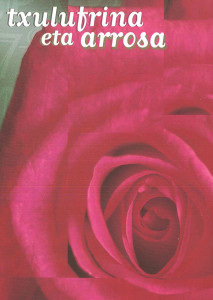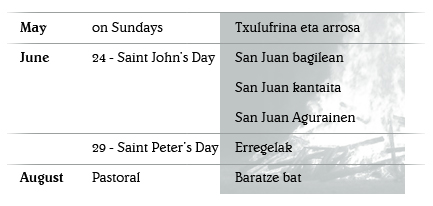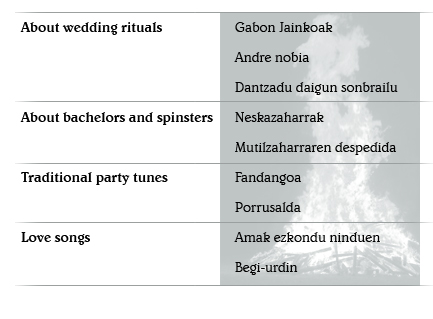 The prime objective of the Urte-sasoiak collection is to highlight the ever-present tight connection in Euskal Herria between the traditional seasons of the year and a set of customs that still are very much alive.
The prime objective of the Urte-sasoiak collection is to highlight the ever-present tight connection in Euskal Herria between the traditional seasons of the year and a set of customs that still are very much alive.
This third booklet is devoted to spring and summer, more specifically, the time span from May and until Saint John’s feast, the time of the year referred to by Julio Caro Baroja as the season for loving (“la estación de amor”). Winter coldness is over, the snow on the mountain peaks melts, the fields, trees, plants… that passed the winter half-dormant, come back to life and grow green again. With the arrival of springtime, the Sun’s heat becomes more intense, and as the old saying claims “Udaberria, odol berria” (Spring brings the renewal of the blood), people acquire new vigour and strength. Traditionally May is considered the month for feasting, growing and loving, and that is why this booklet deals with matters of the heart: serenades, wedding celebrations, love songs, songs dedicated to spinsters and bachelors…, even though they might come to the fore at other times of the year.
The cuckoo’s calling announces the start of the new season. Joyful lines and verses welcome springtime and celebrate the revival of Nature, the awakening of flowering plants and greenery, and the return of birds’ singing. They are songs to indulge in celebration, because winter has ended and spring has returned. Trees, flowers and plants are glorified. And it is within this context that the remaining vestiges of ancient springtime rituals known as Doniane-arbolak, Plantar el mayo or Erreginetan should be understood.
The last of the above-mentioned practices is about young village girls parading from house to house singing certain stanzas and asking for alms. The opening words of the stanza addressed to fellow girls, Txulufrina eta arrosa (the carnation and the rose), give title to the present collection of songs. We found them most appropriate considering that flowers are in fact symbols that best represent the spirit of this cycle.
Here follows a calendar featuring the festivities observed during the summer cycle and the repertoire of traditional musical pieces selected for the present book of songs.
The following songs and customs are not performed on fixed days but pertain to the summer season:





